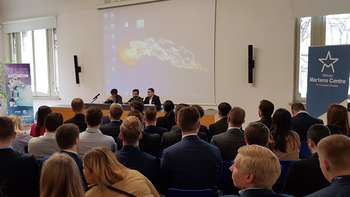Will artificial intelligence take work away from politicians too?
 Work has always been central in economic science and in the third millennium, with robots and artificial intelligence that progress every day at speeds considered improbable until a few years ago, the topic is even more relevant.
Work has always been central in economic science and in the third millennium, with robots and artificial intelligence that progress every day at speeds considered improbable until a few years ago, the topic is even more relevant.
The recent annual convention of YEPP - Youth of the European People's Party, an organization that represents the youth movements of 58 center-right parties in 39 European countries, got an opportunity to discuss about the future of jobs.
The world population is growing at exponential levels and most of the studies foresee that during this fourth industrial revolution more jobs will be lost than the ones created. This makes it clear that the problem is very serious.
In 2000 there were 6.1 billion people, in 2017 the number grew to 7.5 billion and the United Nations estimates that global population will top out at 8.5 billion in 2030. In 2050, when today's students will still be far from the retirement age, the forecast is 9.7 billion people.
However, the problem is not new. Actually, mass unemployment has been a threat since the nineteenth century, during the previous industrial revolutions (steam, electricity, electronics and automation), but alerts were then called off. For instance it may be worth mentioning the 1964 Triple Revolution report from US President Lyndon Johnson.
The continued growth of the population and the predictions on unemployement - such as those presented at the World economic forum in 2016 with the report The Future of Jobs - sets again the concern of economists and politicians on alarming levels. The report foresees that 2 million jobs will be created in top 15 countries worldwide over the next 5 years thanks to Industry 4.0. However, 7 million jobs will disappear, with a 5 million negative balance.
It is not just these numbers that made Martin Ford write in "The future without work" how radically the situation is different from the past and that the fears for workers are well founded. Many studies report that there will always be something to do for professions that require creativity, intuition and social intelligence.
However, even in this field some experiments show that artificial intelligence will also be able to replace humans. The long-term solution proposed by the author is the separation of income from work by introducing forms of citizenship income.
Franco Mosconi of the University of Parma has fully illustrated the impacts of this economic upheaval and concluded his remarks recalling that greater European integration could lead the Union to act with greater authority, which is extremely necessary to govern the radical change currently taking place.
Matthias Schaefer of the Adenauer Foundation reported an interesting timeframe about machines replacing humans even in the most complex professions, estimated in 45 years. He also has provided a list of policy recommendations that will be very useful for young people of YEPP.
One consideration hasn't emerged at the convention: among all the works that will disappear or will be drastically reduced - due to robotics and artificial intelligence - the politician should also be taken in account, even though many do not really consider it as a job.
There has been a lot of interest when the blockchain technology was presented and discussed. It could indeed ensure greater transparency administrative governance and control of public spending. But let's not forget that, for a computer, elaborating an algorithm able to ensure the citizens' welfare will always be more and more plausible thanks to the increasing computational capacity of data analysis.
> A blockchain to better spend EU funds after 2020
The hypothesis has been treated by many science fiction writers and, in a more logical way, also by Isaac Asimov. His famous laws of robotics will probably always remain creations of his imagination but he wisely analysed the interaction between man and artificial intelligence.
The first and most serious problem that computers should solve is about the so-called young people NEET - Not in Education, Employment, or Training.
Who knows, then, if one day artificial intelligence will find a solution to a worrying future without work, proving to be a great political force.




